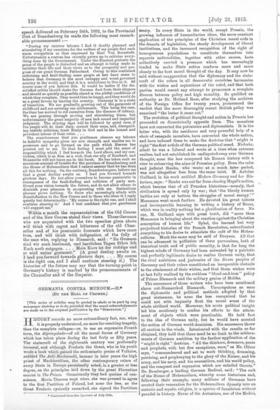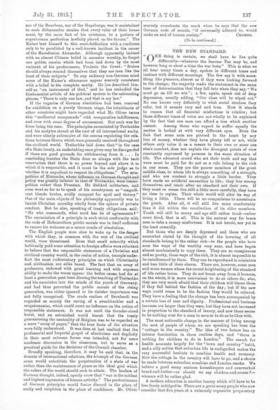GERMANIA CONTRA MUNDUM.—II.• (By env EARL OP °BOXER.)
[This series of articles may be quoted in whole or in part by any newspaper desiring so to do, provided that the usual acknowledgments are made as to the original publication by the " SPZOTATOR.1 HISTORY records no more extraordinary fact, nor, when it is properly understood, no more far-reaching tragedy, than the complete collapse—or, to use an expressive French term, the degringolacle—of all the moral forces of Germany which has taken place during the last forty or fifty years. The statecraft of the eighteenth century was profoundly immoral, and although Frederic the Great, who in his youth wrote a book which gained the enthusiastic praise of Voltaire, entitled The Anti-.Machiavelli, became in later years the high priest of Machiavellism, the other contemporary rulers of every State in Europe persistently acted, in a greater or less degree, on the principles laid down by the great Florentine casuist in The Prince. Occasionally they had qualms of con- science. Maria Theresa wept when she was pressed to agree to the first Partition of Poland, but none the less, as the Great Frederic cynically remarked, she signed the Partition • Continued from the spectator of July 24th. Seedy.. In every 'State in the world, except Prussia, the growing influence of humanitarian ideas, the more constant application of the principles of the Christian moral code in the domain of legislation, the steady development of liberal institutions, and the increased recognition of the ' right of homogeneous populations to constitute themselves into separate nationalities, together with other causes, have collectively exerted a pressure which has unceasingly tended to make State action conform more and more closely to the best moral thought of the day. It may now be said without exaggeration that the diplomacy and the state- craft of the rulers in all democratic countries harmonize with the wishes and aspirations of the ruled, and that both parties would resent any attempt to pronounce a complete divorce between policy and high morality. So qualified an authority as Dr. Holland Rose, after studying the archives of the Foreign Office for twenty years, pronounced the verdict that the more thoroughly recent British policy was examined " the better it came out."
The evolution of political thought and action in Prussia has proceeded on diametrically opposite lines. The moralists have not converted the potentates and diplomatists. It is the latter who, with the assiduous and very powerful help of a choir of renegade moralists, have converted the whole nation, and have induced them to make the doctrine that " might is right" the first article of the German political creed. Niebuhr, albeit he was a Liberal and wrote at a time when extreme realism had not established its undisputed sway over German thought, none the less composed his Roman history with a view to aubserving the aims of Prussian policy. Even the calm and judicial Ranks, who wrote at a much later period, was not altogether free from the same taint. H. Antoine Guilland, in his work entitled Modern Germany and her His- torians, says : " Ranke was not far from sharing Hegel's notion, which became that of all Prussian historians—namely, that civilization is spread only by war; that 'the bloody human battles are only at bottom the struggles of moral energy.' " Mommsen went much further. He devoted his great talents and incomparable learning to writing a history of Rome, which was in reality nothing but a glorification of force. No one, M. Guilland says with great truth, did "more than Mommsen in bringing abort the reaction against the Christian. conception of human life." Sybel, the learned but very prejudiced historian of the French Revolution, subordinated everything to his desire to stimulate the cult of the Hoban. zollerns. Much the same may be said of Droysen. All that can be advanced in palliation of these perversions, both of historical truth and of public morality, is that for long the highest minds of Germany bad been animated by a patriotic and perfectly legitimate desire to realize German unity, that the rival ambitions and jealousies of the divers peoples of Germany and their rulers constituted an insuperable obstacle to the attainment of their wishes, and that those wishes were at last fully realized by the ruthless " blood-and-iron" policy of Prince Bismarck and the military genius of Moltke.
The successors of those writers who have been mentioned above out-Bismaroked Bismarck. Unscrupulous as were the . diplomatic and political methods adopted by that great statesman, he none the less recognized that be could not with impunity float the moral sense of the whole oivilized world. Moreover, his acute political insight led him cautiously to confine his efforts to the attain- ment of objects which were practicable. He held fast to the idea of German unity, but he would have scouted the notion of German world-dominion. His successors threw all caution to the winds. Intoxicated with the results so far obtained, they held that there need be no limit to the achieve- ments of German ambition by the further application of the "might is right" doctrine. "All the thinkers, dreamers, poets and prophets, with but few exceptions, were," as Mr. Oliver says, " commandeered and set to work thinking, dreaming, poetizing, and prophesying to the glory of the Kaiser, and his army, and his navy, and his counsellors, and his world policy, and the conquest and expansion which are entailed therein." Dr. Bamberger, a leading German Radical, said: " The cult of the House of Hohenzollern, whereby some historians and, following their example, many millions. of Germans have erected their veneration for the Hohenzollern dynasty into an ecstatic and mystic religion, is a species of fanaticism without parallel in history. Never of the Antonines, nor of the Medici, nor of the Bourbons, nor of the Hapsburgs, was it maintained in such dithyrambic strains that every ruler of their house must, by the mere fact of his existence, be a pattern of superhuman perfection lawfully placed on the throne.". The Kaiser lent himself to this semi-deification with a readiness only to be paralleled by a well-known incident in the career of the Macedonian Alexander. Although apparently imbued with an almost Chinese belief in ancestor worship, he forgot one golden maxim which had been laid down by the most eminent of his predecessors, Frederic the Great : "Rulers should always remind themselves that they are men like the least of their subjects." To any ordinary non-German mind some of the Kaiser's utterances appear scarcely consistent with a belief in his complete sanity. He has described him- self as " an instrument of God," and he has embodied the fundamental article of his political system in the astounding phrase, "There is only one law, and that is my law."
• If the vagaries of German absolutism had been reserved for exhibition on a purely German stage, the inhabitants of other countries might have regarded what Mr. Oliver terms this "mediaeval masquerade" with comparative indifference, and even with some degree of amusement. But such was far from being the case. The principles enunciated by Treitsohke and his acolytes struck at the root of all international amity, and were utterly subversive of the canons regulating the rela- tions between States which were generally received throughout the civilized world. Treitschke laid down that " in the case of a State treaty, an undertaking once given may be disregarded if there are good grounds for withdrawing from it. . . . In concluding treaties the State does so always with the tacit reservation that there is no power beyond and above it to which it is responsible, and it must be the sole judge as to whether it is expedient to respect its obligations." The sym- pathies of Nietzsche, whose influence on German thought and policy was greatly inferior to that of Treitschke, were cosmo- politan rather than Prussian. He disliked militarism, and even went so far as to speak of his countrymen as " magnifi- cent blonde brutes, avidly rampant for spoil and victory." One of the main objects of his philosophy apparently was to banish Christian morality wholly from the sphere of private conduct. But be also, speaking of treaty obligations, said: " Ho who commands, what need has he of agreements ? " The enunciation of a principle in such strict conformity with the code of Hohenzollern public morals was in itself sufficient to ensure his welcome as a minor oracle of absolutism.
The English people were slow to wake up to the danger with which they, in common with the rest of the civilized world, were threatened. Even that small minority which habitually paid some attention to foreign affairs were reluctant to believe that the responsible statesmen of a Christian and civilized country would, in the realm of action, trample under- foot the most rudimentary principles on which Christianity and civilization are alike based. The fact that an army of professors, endowed with great learning and with supreme ability to make the worse appear the better cause, had for at least a generation past been dinning the teaching of Treitsolike and his associates into the minds of the youth of Germany, and had thus perverted the public morals of the rising generation, was either ignored or its sinister importance was not fully recognized. The crude realism of Bernhardi was regarded as merely the raving , of a ewashbackler and a megalomaniac, which could exert no influence on the action of responsible statesmen. It was not until the thunder-cloud burst, and an astonished world learnt that the treaty guaranteeing the neutrality of Belgium was to he regarded as a mere "scrap of paper," that the true facts of the situation were fully understood. It was then at last realized that the professorial and Imperial gospel of absolutism and duplicity in their most extreme forms was intended, not for more academic discussion in the classroom, but to serve as a practical guide for the decisions of the Council chamber.
Broadly speaking, therefore, it may be said that, in the domain of international relations, the triumph of the German arms would substitute the perpetuation of a state of war rather than the maintenance of peace as the ideal goal which the rulers of the world should seek to attain. The leaders of German thought, indeed, openly avow that " war is the noblest and highest expression of human activity." The predominance of German principles would foster discord in the place of amity and suspicion in the place of confidence. Mr. Oliver scarcely overshoots the mark when he says that the uew German code of morals, " if universally adhered to, would make an end of human society." °swam.
(To be continued.)



































 Previous page
Previous page